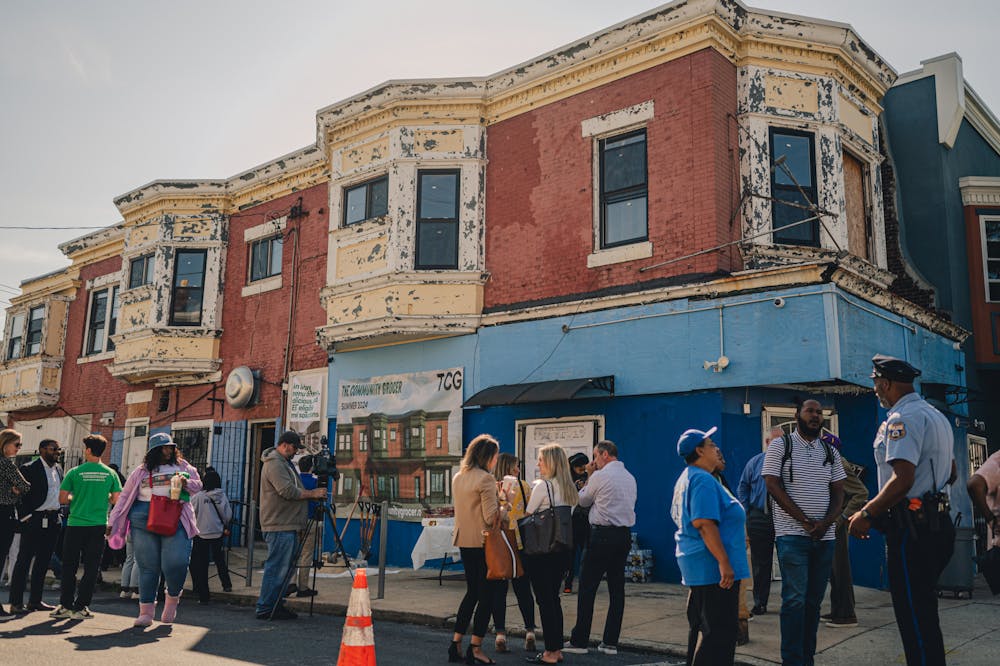From swanky wine bars to hole–in–the–wall neighborhood gems, it’s all too easy to lose oneself in the world of the foodie. But there is a certain privilege in the ability to choose and explore cuisine. Even in something as simple as a home–cooked hot meal. The Community Grocer (TCG) seeks to ensure that every person has access to the kind of warm meals worthy of a rave review.
Founded by Penn grads Alex Imbot (C ‘20) and Eli Moraru (C ‘22) in 2022, the idea for the TCG emerged from the crucible of grassroots community activism during the pandemic. The duo began initiating conversations in Philadelphia communities to try and understand underlying structures influencing food access. In a nation that wastes 40% of its food, they learned that they live in a city where 21% of Philadelphians grapple with food insecurity. Recognizing a broken system that was failing everyone, from local farmers to their neighbors, Imbot and Moraru began to actively support local leaders in managing grassroots food box programs. But they soon discovered these programs were simply not enough to provide sufficient nourishment to recipients.
As they began to ideate a more sustainable solution, Imbot and Moraru learned that Philadelphia boasts over 3,000 independently operated corner stores. But what struck them was the way the legislation governing SNAP benefits and food stamps was crafted in influencing food accessibility. These quintessential establishments readily exchange chips and soda for SNAP benefits but do not offer warm meals, per SNAP regulations. The absurdity lies in the fine lines—the baking, curing, freezing, packing, and shipping of a Hot Pocket somehow circumvents the definition of "cooking." But, as Moraru says, “Having a meal prepared in front of you with love and a friendly smile is forbidden.” It's a system filled with peculiarities that are not only exploited, namely by major multinational corporations, but that has major socio—economic and health—related consequences.
Reflecting on the policies governing SNAP benefits that have contributed to food insecurity, Imbot points out inherent racism that contradicts fundamental principles of self-determination and dignity. He calls it “absurd” for anyone to dictate how you should spend your money. A hot, delicious, fresh meal is not just nourishment for the body; it warms the soul and brings communities and families together. “Food is the essence of life and an expression of love and should be within a short walk of your neighborhood,” he continues.
The store, slated to launch this summer, will feature a dedicated area where patrons can purchase ready–to–cook meal kits and access a fully equipped commercial kitchen to prepare their meals. Additionally, the store will house a conventional grocery and supermarket section. All items available at the store will be accessible for purchase using a SNAP EBT card.

Photo courtesy of The Community Grocer
The ingenuity of the model,” Imbot comments, “Is that it ensures that everyone has access to that empowering meal regardless of how they pay for it.” TCG celebrates ingredients, understands their origins, and recognizes their transformative potential. This empowers community members to “reshape their connection with the very ingredients that sustain them, bringing freshness, community, and love back into the equation,” he continues.
At TCG, your receipt is your recipe, your invitation to engage with the ingredients that come neatly sorted, chopped, and marinated in your package. The inherent beauty of this approach is the opportunity it provides to reflect on the origins of food, its transformation from its natural state, and what it takes for it to evolve into a delicious meal. “The menu at TCG embraces diversity, mirroring the multicultural tapestry of our neighborhood and beyond,” Moraru explains. “With every ingredient, there's a story, and sharing these narratives opens the door to heightened awareness and appreciation of the rich cultural traditions surrounding food, creating a welcoming space for everyone.”
“There is nothing copy and paste about any of this,” Imbot says. “We are just stewards of a vision and an interpretation of a policy.” The founders have made it their mission to establish both the physical space and the conceptual framework, fostering a collaborative environment where neighbors from West Philadelphia and beyond can come together to dream, brainstorm, and envisage what the corner store can ultimately become. They emphasize that everyone is an expert in their relationship with the food system that they participate in daily. From community leaders to pastors, dedicated activists, block captains, and even the spirited kids on the streets, TCG has been met with love and excitement, underlying the collective ownership that the community feels towards this initiative.
Imbot and Moraru define themselves as part of the new generation of changemakers who dare to challenge the status quo and envision a world where equality prevails. Their commitment is a race against time, for each day's delay is a day their neighbors may have to settle for inadequate nourishment. The opening of TCG is part of a movement of young people unwilling to accept the status quo. It’ll be the start of a much broader neighborhood renaissance that engages in conversations encompassing topics like land rights, food security, health justice, and economic equality. And it'll begin with a simple shared meal, a fresh breakfast, lunch, or dinner.
Food isn’t just a problem in Philadelphia. Imbot and Moraru envision a model that extends far beyond the boundaries of their current location—a model that can be recreated and co-created in every neighborhood across America that is in need. Recognizing that the food landscape can vary dramatically from one ten–square–block area to another, the goal is to build TCGs that cater to the unique needs and tastes of each community, with a shared commitment to reshaping their relationship with food.
Imbot and Moraru are focused on growing the TCG family. As a grassroots movement, financial support is essential, whether through fundraisers or donations. Students can also get involved in various ways, from disseminating information about their mission to joining their team—especially through coding. Turning the food system on its head, TCG embodies equality, nourishment, and a community reconnected through food; they are creating a better future, one meal at a time.

